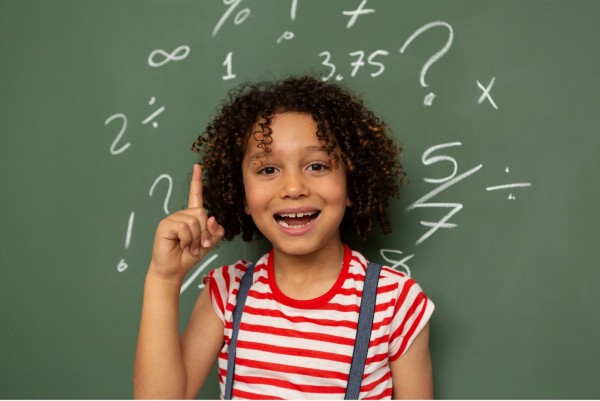Math skills are vital for a strong academic foundation. While many parents know of the importance of literacy skills in future academic progress, math skills for preschoolers are just as important as a foundational skill for future success.
At Children’s Lighthouse, we believe in the power of math and have Math Learning Centers in our preschool classrooms and a Math Learning Lab in our school-age Questing Studio. Special lessons and activities are integrated into our curriculum for infants through school-age to prepare children for the rigors of a life full of STEM learning.
The good news is that math is everywhere, so families can add mathematical fun into their days! Here is a list of some of the most important basic math concepts young children will learn growing up and everyday examples of how to work on them at home!

Number Recognition- This is the ability to recognize numbers by their name and symbol.
- Number books- Add a number book into your everyday reading routine
- Number hunt- Go on a walk at your house, park, store, etc. looking for numbers
Counting- This is the ability to count individual items to get to a total.
- Counting Snacks- Count and sort your snacks pieces into different number groups or numeral shapes before eating them
- Laundry Count- Count how many shirts, socks, pants they have as you do laundry
- More or Less- Play a game of more or less anytime there are two groups. Ask your child to guess with group has more or less. Count the groups together and see if he/she was right.
Shape Recognition- This is the ability to identify shapes by their name and symbol.
- Shape Hunt- Go on a walk at your house, park, store etc. looking for shapes
- Body Shapes- Say the name of a shape and try to make it with your body
- Playdough Shapes- Create different shapes while playing with playdough
Ordering/Seriation- This is the ability to mentally arrange things in a particular order such as size
- Nesting Cups/Blocks- Stacking cups from biggest to smallest
- Family Line Up- Line up the family from biggest to smallest or smallest to biggest
- Cooking Time- Choose ingredients such as noodles, fruit, etc. that are being used and have them sorted in size order
Patterns- The ability to look at information, identify the pattern, then continue or re-create it such as color patterns.
- Playdough Patterns- Put pieces of different colors in order in a line and have them re-create it
- Sticker Patterns- Have a simple 2-3 color pattern going and ask what color sticker comes next
- Clapping Game- Start a clapping game where you clap your hands together and on your legs. Do a basic hand leg pattern until they catch on then slowly change it up
Math is everywhere and is easily reinforced from home! These basic math skills are fun to explore and will help build much needed thinking and problem-solving skills later on in life. Try adding them into your normal routine and see how much fun math can really be!

